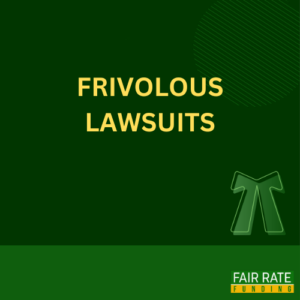Frivolous Lawsuits – Costs and System Safeguards
Lawsuits are a fundamental aspect of the legal system, serving as a mechanism for resolving disputes and ensuring justice. However, within the system is the ability of claimants/plaintiffs to initiate proceedings often referred to as frivolous lawsuits – legal actions which lack merit, are filed primarily to harass, intimidate, or extort defendants rather than to seek legitimate justice.
While frivolous lawsuits can capture public attention and spark outrage, a deeper look into their implications is in order. In this post, we delve deeper into frivolous lawsuits and their implications on society and also relate them to lawsuit funding.
The Cost of Frivolous Lawsuits
Frivolous lawsuits come with significant costs, not only for the parties directly involved but also for the legal system and its participants. Since the civil justice system is primarily publicly funded, these costs are a drag on society as a whole and manifest in various ways:

Financial Burden
Frivolous lawsuits impose a substantial financial burden on defendants who bear the costs of legal defense, potentially draining resources which can be allocated elsewhere. These additional costs must be borne by someone and are normally passed on to the end users of products and services.
Waste of Judicial Resources
Frivolous cases divert valuable resources away from legitimate legal matters before the court. This backlog creates legal system delays and impacts timely justice for real claimants. In many jurisdictions, plaintiffs must wait many months or even years before their cases are resolved. Of course, these delays are not solely caused by frivolous lawsuits but a lack of allocated resources to a crowded civil docket. Frivolous cases only add to an existing problem.
Impact on Reputation
Defendants targeted by frivolous lawsuits may suffer reputational damage, regardless of a case’s merit. Even if lawsuits are ultimately resolved in defendants’ favor, damage to their reputations can endure.
Chilling Effect
Frivolous lawsuits can discourage innovation and entrepreneurship. Fear of litigation may deter individuals and businesses from engaging in activities that could potentially attract legal scrutiny, stifling economic growth and creativity.
If You Have Any Questions, Call 888-964-2224
WE ARE HERE TO HELP YOU!
Safeguards Against Frivolous Lawsuits in the Legal System
Despite the challenges posed by frivolous lawsuits, the legal system incorporates several safeguards to mitigate their impact and ensure the fair and efficient administration of justice. These include:
Rule 11 Sanctions
In the United States federal courts, Rule 11 of the Federal Rules of Civil Procedure empowers judges to impose sanctions on parties or attorneys who file frivolous lawsuits or pleadings. These sanctions may include monetary penalties or disciplinary actions.
Attorney Oversight
Legal professional bodies (bar associations) regulate the conduct of attorneys and impose ethical obligations to discourage the filing of frivolous lawsuits. Attorneys found to engage in unethical behavior, including the pursuit of meritless claims, risk disciplinary measures, including suspension or disbarment.
Summary Judgment
Courts have the authority to grant summary judgment in cases where there is no genuine issue of material fact, effectively disposing of frivolous claims at an early stage of litigation without the need for a trial.
Cost Recovery
In some jurisdictions, defendants who successfully defend against frivolous lawsuits may be entitled to recover their attorney fees and litigation costs from the plaintiff, serving as a deterrent against baseless litigation.
Judicial Discretion over Frivolous Lawsuits
Judges possess discretion to dismiss frivolous lawsuits, impose sanctions, and manage cases efficiently to uphold the integrity of the legal process.
Business Costs
Plaintiff attorneys on contingency fee retainers often front the costs of pursuing a claim for their clients. Frivolous lawsuits represent a business loss for these firms so they are unlikely pursued for business reasons.
Frivolous Lawsuits and Legal Funding
One common critique of the legal funding industry is that the practice encourages litigation of matters which would ordinarily be resolved without it. Critics predict that frivolous lawsuits increase when litigants can find investors to cover litigation costs (commercial litigation and/or mass torts). They argue that lawsuits continue too long if parties do not face economic pressure to resolve the case before trial.
If legal funding cash advances on pending lawsuits were available to anyone and everyone, perhaps their argument would have merit. Their arguments fail however, since these criticisms assume lawsuit loans (legal funding) are available to all litigants.
In reality, more goes into lawsuit loan approvals than just being a named plaintiff on a filed complaint. Lawsuit funding companies go through the lawsuit loan process and painstaking underwriting in order to identify “fundable” lawsuits. And a fundable lawsuit means a case with a strong likelihood of success since cash advances on pending lawsuits are not repaid if cases are lost. The non-recourse nature of these transactions means that legal funding capital flows to the best lawsuits, not frivolous ones.
Conclusion
Frivolous lawsuits represent a challenge within the legal landscape, with significant costs and implications for all stakeholders involved. However, the legal system incorporates various safeguards to address these challenges, promoting fairness, efficiency, and the pursuit of legitimate justice.
By upholding ethical standards, exercising judicial discretion, and imposing consequences for misconduct, the legal framework endeavors to strike a balance between access to justice and the prevention of abuse. Ultimately, fostering a culture of responsibility and accountability among litigants and legal practitioners is essential to safeguarding the integrity of the legal system and preserving public trust in the pursuit of justice.
Thank you for your interest in lawsuit funding.

